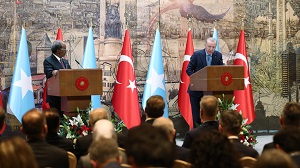Can the Arab East move past the mess it is in? - By James J. Zogby, The Jordan Tiimes
I have been on vacation for the past two weeks. Unlike previous years, this time I cut myself off from work. During the past few days, I have been catching up, reading two weeks of news about depressingly familiar developments unfolding (or not) in Lebanon, Syria, Palestine/Israel and Iraq.
Lebanon, still on the brink of collapse, cannot form a fully functioning government because sectarian elites seem intent on sucking the last bit of marrow from the country’s dying bones. Sectarian gridlock, enforced by Hizbollah’s threats, prevents accountability for past crimes and has resulted in shortages of basic services, fuel, food, and money. Even if the Lebanese succeed in winning control of gas fields in the Mediterranean, they have legitimate fears of a power grab by sectarian elites who will drain the proceeds to serve their own interests, rather than the country’s.
Syria is still at war with itself, with Russian, Iranian, Turkish and American interests colliding and sometimes colluding in different combinations over the future of the tragic mess they (and the brutal Assad regime) all helped to create. While this game of nations continues to be played, millions of Syrians remain destitute, either internally displaced or as refugees fearful of returning to their homes.
Iraq is paralysed, owing to the “genius” of the Americans whose “gift” to the Iraqi people was to mimic the French-created sectarian-based system of governance that proved so disastrous for Lebanon. Though polling in Iraq (as in Lebanon) makes clear that most want a non-sectarian unified country independent of any foreign power, the elites (backed by their militias, many Iran-supported) are unwilling to surrender control. Paralysis and the threat of renewed civil war may be killing Iraq, but Iran and its minions are unwilling to move toward non-sectarian governance.
Speaking of “gifts”, the one that continues to roil the region was Lord Balfour’s arrogant decision to implant the Zionist movement in Palestine to serve British interests in the Eastern Mediterranean. This act and seven decades of political protection and massive military and economic aid from the US has led the region to today’s reality, an Israeli state that operates with impunity flaunting international law and violating Palestinian rights.
Now preparing for its fifth election in four years, Israel’s politics, as a result of US coddling, has moved so far to the right that there is a unique form of gridlock in the country. At issue is not peace with Palestinians, but whether the next right-wing government will be led by Benjamin Netanyahu.
The dysfunctions plaguing the Palestinians result from decades of cruel occupation during which Israel used overwhelming force to crush their resistance, de-develop their economy, and sabotage their political and social underpinnings. Palestinian also suffers from a lack of leadership capable of developing a strategic vision and the tactics to realise that vision. What Palestinians have been left with are repressive patronage systems in Gaza and the West Bank that have been reduced to repressive dependencies, relying on Israel and international donors for support.
On reflection, threads tie these dysfunctions together. One is the evil of sectarian and ethnic divisions, promoted and exploited by external powers. It’s tempting to ask how different the region would be today if the British and French had deferred to the will of the people of Arab East and if the Americans had not played this same imperial game, updating it to serve their interests?
This must not be the end of the story. Several years ago, a leader of the Syrian resistance, as he was leaving my office after a meeting, turned at the door and asked poignantly: “Where will the region be in the next 10, 20, or 50 years?” I urged him to return, and we spoke for another hour about the region’s need for visionary thinking that would ask just that question.
The Arab East cannot continue to blame its failings on the machinations of others. Arabs must take their destiny into their own hands and develop a vision that unites and inspires citizens to free themselves from the shackles of sectarianism, corruption, extremism, and defeatism. Otherwise, after next year’s vacation and those thereafter, I’ll be reading the same articles about the same problems.
The writer is president of the Washington-based Arab American Institute
Latest News
-
 Turkey calls 'Israel's' recognition of Somaliland 'illegitimate'
Turkey calls 'Israel's' recognition of Somaliland 'illegitimate'
-
 Trump warns Hamas, Iran after Netanyahu talks
Trump warns Hamas, Iran after Netanyahu talks
-
 UAE denies Saudi accusation of fuelling Yemen conflict
UAE denies Saudi accusation of fuelling Yemen conflict
-
 Syria reveals new post-Assad banknotes
Syria reveals new post-Assad banknotes
-
 Hamas Armed Wing Refuses to Surrender Weapons, Confirms Spokesman Killed by Israel in August
Hamas Armed Wing Refuses to Surrender Weapons, Confirms Spokesman Killed by Israel in August